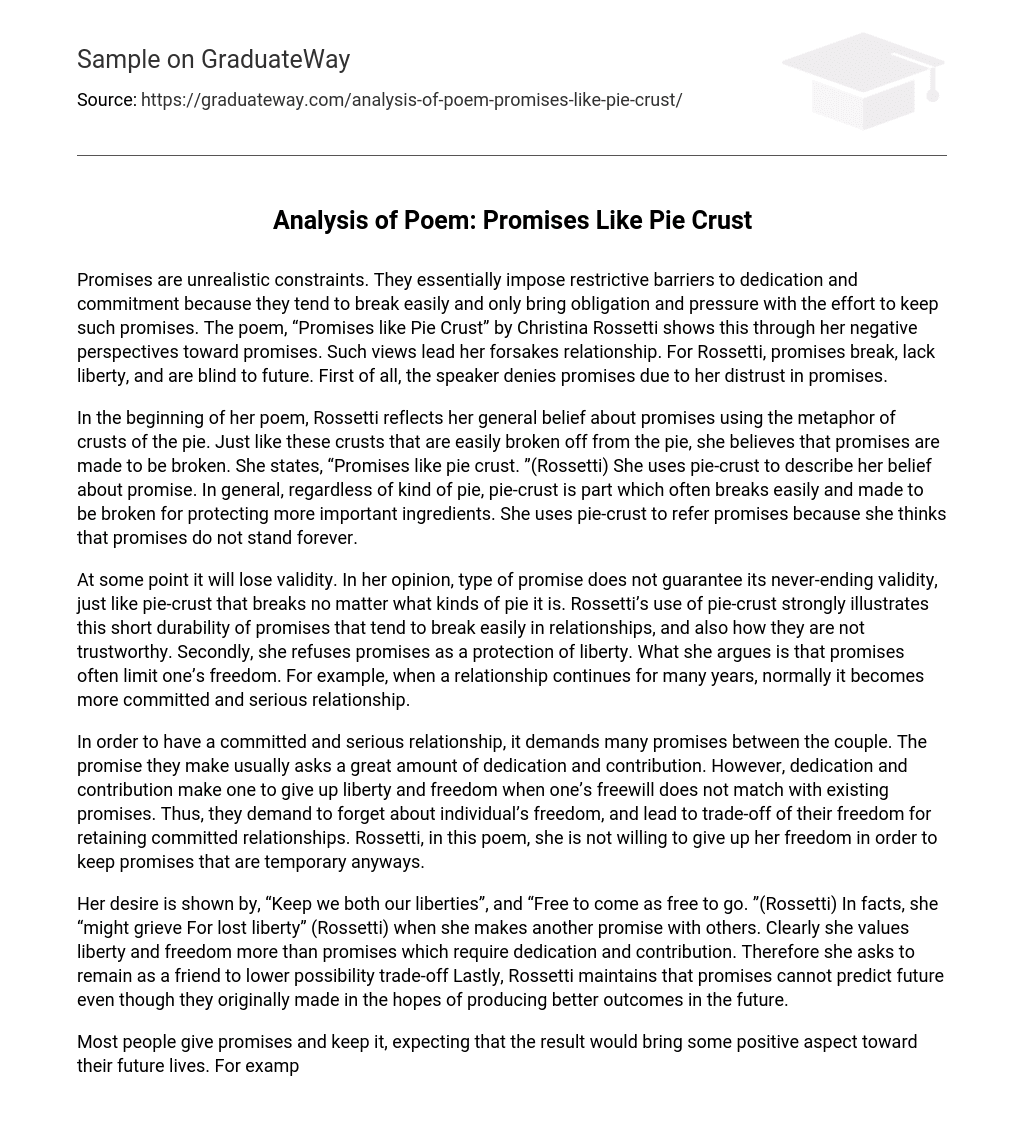Promises are unrealistic constraints. They essentially impose restrictive barriers to dedication and commitment because they tend to break easily and only bring obligation and pressure with the effort to keep such promises. The poem, “Promises like Pie Crust” by Christina Rossetti shows this through her negative perspectives toward promises. Such views lead her forsakes relationship. For Rossetti, promises break, lack liberty, and are blind to future. First of all, the speaker denies promises due to her distrust in promises.
In the beginning of her poem, Rossetti reflects her general belief about promises using the metaphor of crusts of the pie. Just like these crusts that are easily broken off from the pie, she believes that promises are made to be broken. She states, “Promises like pie crust. ”(Rossetti) She uses pie-crust to describe her belief about promise. In general, regardless of kind of pie, pie-crust is part which often breaks easily and made to be broken for protecting more important ingredients. She uses pie-crust to refer promises because she thinks that promises do not stand forever.
At some point it will lose validity. In her opinion, type of promise does not guarantee its never-ending validity, just like pie-crust that breaks no matter what kinds of pie it is. Rossetti’s use of pie-crust strongly illustrates this short durability of promises that tend to break easily in relationships, and also how they are not trustworthy. Secondly, she refuses promises as a protection of liberty. What she argues is that promises often limit one’s freedom. For example, when a relationship continues for many years, normally it becomes more committed and serious relationship.
In order to have a committed and serious relationship, it demands many promises between the couple. The promise they make usually asks a great amount of dedication and contribution. However, dedication and contribution make one to give up liberty and freedom when one’s freewill does not match with existing promises. Thus, they demand to forget about individual’s freedom, and lead to trade-off of their freedom for retaining committed relationships. Rossetti, in this poem, she is not willing to give up her freedom in order to keep promises that are temporary anyways.
Her desire is shown by, “Keep we both our liberties”, and “Free to come as free to go. ”(Rossetti) In facts, she “might grieve For lost liberty” (Rossetti) when she makes another promise with others. Clearly she values liberty and freedom more than promises which require dedication and contribution. Therefore she asks to remain as a friend to lower possibility trade-off Lastly, Rossetti maintains that promises cannot predict future even though they originally made in the hopes of producing better outcomes in the future.
Most people give promises and keep it, expecting that the result would bring some positive aspect toward their future lives. For example, a couple gives many kinds of promise hoping their future relationship would become closer and deeper when all promises are kept properly. Yet the future does not come exactly as same as they expected. The relationship also has possibility to change worse than before. Rossetti points out promises’ uncertainty by using metaphor of blurred image the glass. “Fades the image from the glass, And the fortune is not told. (Rossetti) This shows how she uses and depicts an object behind the glass in order to portray how it is hard to recognize the object until one actually faces it up close. Thus, one cannot know the consequences of promises that are only blurry and figure-less, without possibility for zoom-ins to predict their outcomes. As the future is not predictable, keeping promises does not guarantee a positive future. For Rossetti, therefore, promises are imaginary bonds based on uncertainty and also that will only create blurs in relationships because they cannot predict the future.
In conclusion, promises shatter; limit freedom, and produce uncertainty of future. Christina Rossetti expresses her feeling about promises on her poem, “Promises like Pie Crust. ” Her negative impression about promise leads her to refuse promise. Just like Rossetti’s opinion, promises are assembly of unreal commitment. It represents insignificant and unrealistic constraints that rather hinder long-term commitments and relationships with their tiring obligations that follow with them





